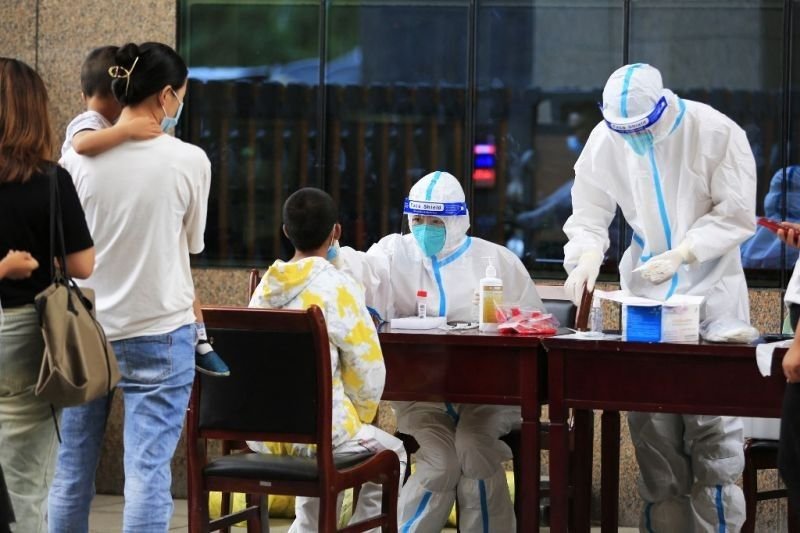New Delhi, 27 May 2025: As India battles a fresh surge in COVID-19 cases, health authorities have confirmed that the number of active infections has crossed the 1,000 mark. Kerala has emerged as the worst-affected state with over 430 active cases, prompting enhanced surveillance and public health monitoring. The rise in cases comes amid growing concerns about the emergence of new sub-variants of the coronavirus—namely NB.1.8.1 and LF.7—detected in multiple parts of the country.
According to official data from the Indian SARS-CoV-2 Genomics Consortium (INSACOG), one case of the NB.1.8.1 variant and four cases of the LF.7 variant have been reported in India. These variants are believed to be more transmissible and could potentially contribute to the sudden increase in cases being seen in several states.
New Wave Triggers Alarms Across States
Apart from Kerala, states like Maharashtra, Karnataka, Delhi, and Telangana have also reported an uptick in daily infections. Health departments in these regions have begun ramping up testing, contact tracing, and hospital preparedness measures. While the numbers are still low compared to previous waves, the rapid increase within a short period has put health officials on high alert.
Pune has already started contact tracing efforts after a cluster of positive cases emerged in the city. Bengaluru and Delhi are also intensifying local containment measures and urging residents to adhere strictly to COVID-19 safety protocols, including mask usage in crowded places and regular hand hygiene.
New COVID-19 Sub-Variants: What We Know So Far
While the JN.1 variant remains the dominant strain in Asia, scientists are closely monitoring two emerging sub-variants: NB.1.8.1 and LF.7. These have recently been detected in India and are associated with the new wave of infections.
Although research is ongoing, early findings suggest that these sub-variants may have mutations that enhance their ability to spread quickly. Some virologists warn that these variants might also cause more severe symptoms, especially in the elderly and people with comorbidities. However, more data is required to confirm these assumptions.
INSACOG continues to track the genetic evolution of the virus in India through widespread genome sequencing, and further updates are expected in the coming weeks.
Symptoms to Watch Out For
Doctors are urging the public to remain cautious and report any symptoms immediately. The current wave has seen patients experiencing not just typical cold-like symptoms but also some potentially severe warning signs.
Common symptoms include:
- Persistent cough
- Cold and congestion
- Fever
- Shortness of breath
- Drop in oxygen saturation
- Chest tightness
- Fatigue and body ache
Health professionals recommend that anyone experiencing breathing difficulties or a noticeable drop in oxygen levels should seek immediate medical care.
Health Officials Urge Caution, Not Panic
Health authorities are emphasizing that while the spike in cases is concerning, there is no need for panic. The current situation, according to the Ministry of Health, remains under control due to prior vaccination coverage and experience in managing COVID waves.
Dr. Dinesh Goel, President of IMA Janakpuri, shared his insights: “There is no need for panic. What we recommend is enhanced surveillance and continued public awareness. By following simple precautions like mask usage in crowded areas and maintaining hygiene, we can manage the situation effectively.” He further added that hospitals are on standby with adequate infrastructure and manpower to handle any possible spike in hospitalizations.
The central and state governments have already stepped up their preparedness measures. Hospitals are being asked to review their oxygen supply levels, ICU bed availability, and medicine stock. Mock drills are also being planned to assess readiness in case of a rapid spike.
In a press briefing, Delhi Chief Minister Rekha Gupta urged citizens to stay calm and reassured them that the healthcare system is fully prepared to tackle any surge.
“We are ready. Hospitals have been directed to be on alert. Citizens must follow safety guidelines and avoid unnecessary panic,” she said.
How To Stay Safe From COVID?
To curb the spread of infection, health experts advise the public to:
- Wear masks in public spaces, especially indoors and crowded areas
- Maintain hand hygiene by washing hands frequently or using sanitizers
- Avoid close contact with anyone showing COVID-like symptoms
- Ensure ventilation in closed spaces
- Get tested if any symptoms develop
- Isolate immediately if testing positive
With COVID-19 making a slow but concerning comeback in India, the focus remains on vigilance, responsible public behavior, and continued tracking of emerging variants. While Kerala currently reports the highest number of active cases, the situation remains dynamic across the country. As the new NB.1.8.1 and LF.7 variants make their presence known, timely detection and precautionary steps will be key to preventing another large-scale outbreak.







